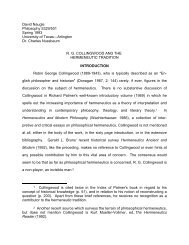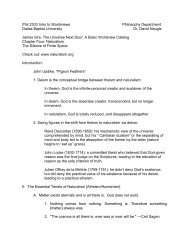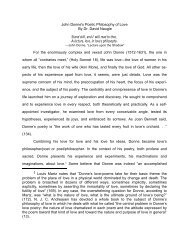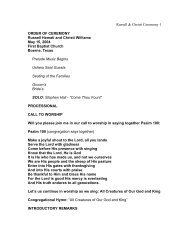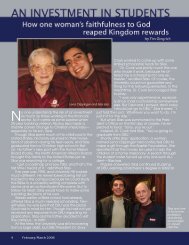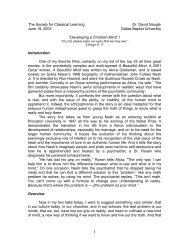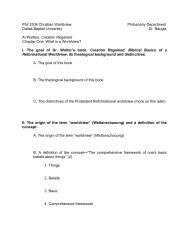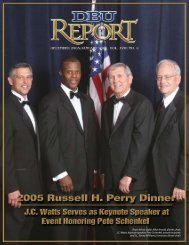A Bad Set of Fellows
A Bad Set of Fellows
A Bad Set of Fellows
Create successful ePaper yourself
Turn your PDF publications into a flip-book with our unique Google optimized e-Paper software.
(22). Mrs. Joe gives Tickler (her rod <strong>of</strong> punishment) a name, but Pip has one only when<br />
he gives it to himself. Dorothy Van Ghent associates this “picture, in which the qualities<br />
<strong>of</strong> things and people were reversed,” with an environment <strong>of</strong> dehumanization in the age<br />
<strong>of</strong> industrialization (128). This may be true, but as we have shown, the devaluation <strong>of</strong><br />
children was ingrained into the society long before Dickens highlighted it.<br />
Years later, when Pip returns home to attend his sister’s funeral, his consciousness<br />
<strong>of</strong> his sister’s cruelty has grown: “As I walked along, the times when I was a little<br />
helpless creature and my sister did not spare me, vividly returned” (260). Fittingly, she is<br />
now devalued as he once was. Speaking <strong>of</strong> her remains, he says: “[I] began to wonder in<br />
what part <strong>of</strong> the house it—she—my sister was” (261, emphasis mine). When the<br />
undertakers bear his sister’s body to the grave in typical Victorian ceremony, “the six<br />
bearers must be stifled and blinded under a horrible black velvet housing with a white<br />
border, the whole looked like a blind monster with twelve human legs, shuffling and<br />
blundering along” (262). The cruelty <strong>of</strong> parents and guardians to the children in their<br />
homes dehumanizes both the children and the adults, it is implied.<br />
As mentioned earlier, the prevalent view <strong>of</strong> children in Victorian England was<br />
that they were reprobates by nature. Pip’s sister sees him as a young <strong>of</strong>fender “to be dealt<br />
with according to the outraged majesty <strong>of</strong> the law . . . born in opposition to the dictates <strong>of</strong><br />
reason, religion, and morality” (20). Under the burden <strong>of</strong> guilt for aiding the convict, Pip<br />
wonders if even the Church is “powerful enough to shield” him (20-21). After all, the<br />
church and state—as suggested when Pip sees the upside-down church in the<br />
graveyard—are upside-down in relation to Pip’s intuitive sense <strong>of</strong> fairness. What seems<br />
wrong to Pip is held to be right by his culture. As Jack Rawlins asserts, “The novel<br />
begins with Pip caught in Dickens’ own childhood nightmare; he looks at the world and<br />
sees everything out <strong>of</strong> joint, corrupt and unfair, but the adult world assures him that<br />
everything’s fine” (81). After all, the community thinks Mrs. Joe is an admirable<br />
housewife and guardian, and that Miss Havisham is simply eccentric, not cruel and<br />
perverse. “When the church came to itself” (2) in the opening scene, the Church and<br />
state and Victorian society had not yet done so.<br />
Dickens had little patience with parents who, like his own, were unsympathetic<br />
with the desire <strong>of</strong> children to learn. When Pip asks repeatedly about the prison ships that<br />
everyone is talking <strong>of</strong>, Mrs. Joe reprimands him and finally exclaims, “People are put in<br />
the Hulks because they murder, and because they rob, and forge, and do all sorts <strong>of</strong> bad;<br />
and they always begin by asking questions [emphasis mine]. Now you get along to bed!”<br />
(12). Dickens thus condemns guardians who fail to educate the young, and also satirizes<br />
the Victorian belief in criminals having been born with evil predispositions.<br />
In light <strong>of</strong> reports from contemporary Victorian criminologists, Mrs. Joe’s<br />
attitudes toward education are markedly ironic. In 1853, Crime: Its Amount, Causes, and<br />
Remedies was published by Frederic Hill, who according to the title page, was “Barrister-<br />
At-Law, Late Inspector <strong>of</strong> Prisons.” Hill enumerates the chief causes <strong>of</strong> crime in Great<br />
Britain, and heading the list are “bad training and ignorance.” Then he lists remedies, and<br />
leading the list are the spread <strong>of</strong> knowledge and a good education (34). By his own<br />
record, Hill had reported in 1845, “One plain fact showing the extent to which crime is<br />
caused by the neglect <strong>of</strong> children, is the large number <strong>of</strong> orphans always to be found in<br />
prison . . . . and the greater portion <strong>of</strong> the parents who were living were not <strong>of</strong> good<br />
character” (36-37). He added that being able to read and write shielded children from<br />
4



